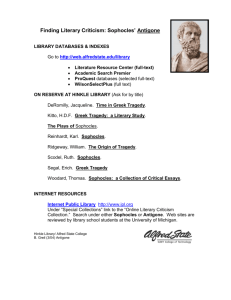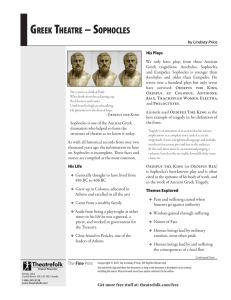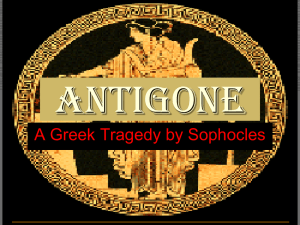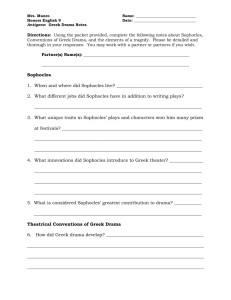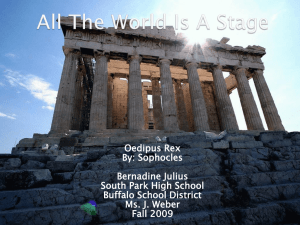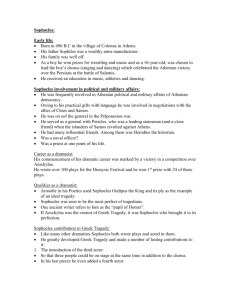Study Guide: Sophocles PHIL301 Prof. Oakes Winthrop University
advertisement
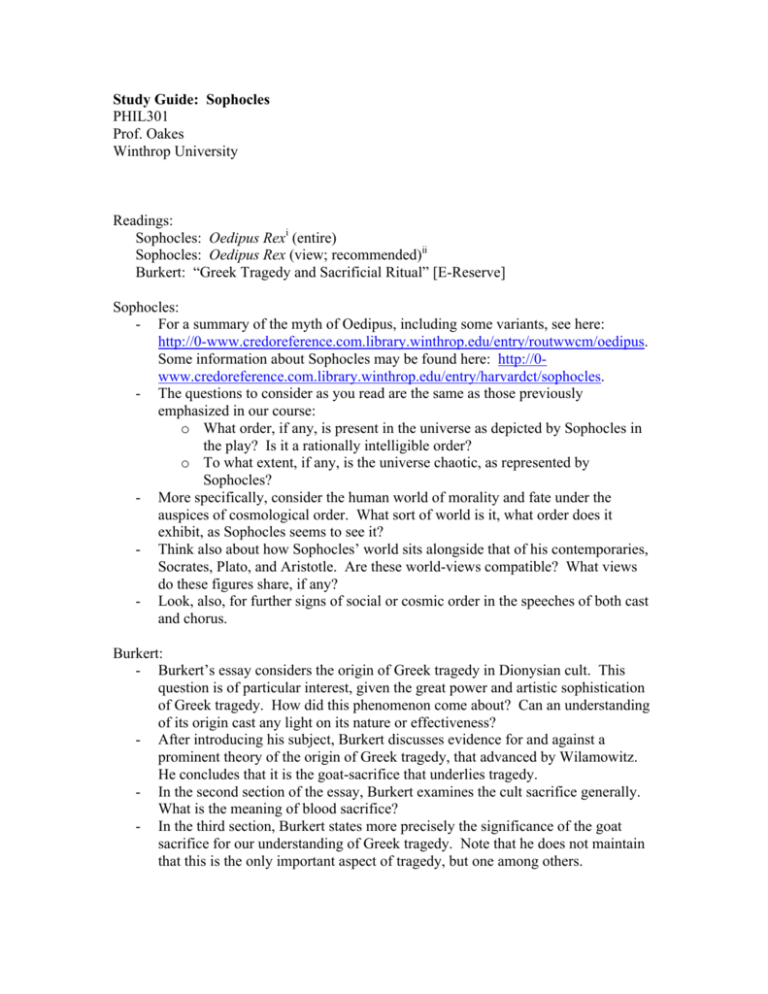
Study Guide: Sophocles PHIL301 Prof. Oakes Winthrop University Readings: Sophocles: Oedipus Rexi (entire) Sophocles: Oedipus Rex (view; recommended)ii Burkert: “Greek Tragedy and Sacrificial Ritual” [E-Reserve] Sophocles: - For a summary of the myth of Oedipus, including some variants, see here: http://0-www.credoreference.com.library.winthrop.edu/entry/routwwcm/oedipus. Some information about Sophocles may be found here: http://0www.credoreference.com.library.winthrop.edu/entry/harvardct/sophocles. - The questions to consider as you read are the same as those previously emphasized in our course: o What order, if any, is present in the universe as depicted by Sophocles in the play? Is it a rationally intelligible order? o To what extent, if any, is the universe chaotic, as represented by Sophocles? - More specifically, consider the human world of morality and fate under the auspices of cosmological order. What sort of world is it, what order does it exhibit, as Sophocles seems to see it? - Think also about how Sophocles’ world sits alongside that of his contemporaries, Socrates, Plato, and Aristotle. Are these world-views compatible? What views do these figures share, if any? - Look, also, for further signs of social or cosmic order in the speeches of both cast and chorus. Burkert: - Burkert’s essay considers the origin of Greek tragedy in Dionysian cult. This question is of particular interest, given the great power and artistic sophistication of Greek tragedy. How did this phenomenon come about? Can an understanding of its origin cast any light on its nature or effectiveness? - After introducing his subject, Burkert discusses evidence for and against a prominent theory of the origin of Greek tragedy, that advanced by Wilamowitz. He concludes that it is the goat-sacrifice that underlies tragedy. - In the second section of the essay, Burkert examines the cult sacrifice generally. What is the meaning of blood sacrifice? - In the third section, Burkert states more precisely the significance of the goat sacrifice for our understanding of Greek tragedy. Note that he does not maintain that this is the only important aspect of tragedy, but one among others. Some Terminology: chthonic: of or pertaining to the underworld Dionysia, Greater, Lesser: festivals, greater and lesser, devoted to the god Dionysus dithyramb: a hymn to Dionysus; the musical form typical thereof peripatetic: of or pertaining to Aristotle or the Aristotelian school of thought (after peripatetic, meaning “walking about”: Aristotle is said to have lectured while walking about the gardens of the Lyceum) Promethean division: that divide in time before/after which humans were in possession of fire satyr: a woodland god associated with Dionysus, god of drink and revelry; variously depicted with the ears and tail of a horse, hooves and horns of a goat Thespis: Greek poet credited with the first tragedy play (6th C.) tragos: Greek for goat i Sophocles’ Oedipus Rex may be found here: http://classics.mit.edu/Sophocles/oedipus.html ii Two outstanding film versions of Oedipus Rex are the film by Pier Pasolini and Seiji Ozawa’s production of the Stravinsky opera, Oedipus Rex. Both are available from Netflix; the Stravinsky may be viewed here: http://www.youtube.com/watch?v=FyeR8lY7A_8. Unfortunately, Pasolini’s version isn’t available on YouTube with subtitles. You can find it without, however.

